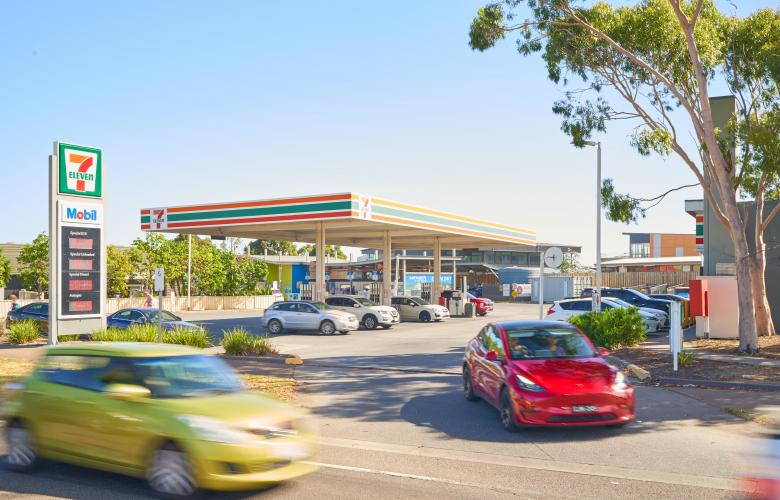Why Investing in Australia's convenience retail sector is proving lucrative - Burgess Rawson
Contact
Why Investing in Australia's convenience retail sector is proving lucrative - Burgess Rawson
Convenience retail is proving to be a lucrative investment avenue in Australia, mirroring shifting consumer preferences and busier lifestyle trends says Burgess Rawson Partner, Jamie Perlinger
Convenience retail is proving to be a lucrative investment avenue in Australia, mirroring shifting consumer preferences and busier lifestyle trends.
With urbanisation accelerating and time becoming increasingly scarce, Australians are placing greater emphasis on convenience in their shopping routines, driving up demand for retail outlets that offer quick access to everyday essentials.
The appeal of convenience retail lies in its ability to meet the diverse needs of modern consumers efficiently. Offering a one stop shop that can combine everything, they typically offer fuel with grocery stores, cafes and fast food outlets.
More recently major hubs are now including childcare facilities to cater to busy individuals seeking convenience. As a result, convenience retail assets have become highly sought after by investors looking to capitalise on this growing market segment.
Burgess Rawson's analysis indicates that despite the rise in yields amidst cash rate increases, renewed confidence in the economy has been observed, buoyed by correlated growth in car sales and fast food products.
One of the key drivers of convenience retail's success is its resilience in the face of economic downturns and market fluctuations. Unlike discretionary spending, which tends to fluctuate with economic conditions, demand for everyday essentials remains relatively stable.
This inherent stability makes convenience retail assets a defensive investment option, appealing to investors seeking consistent returns and long-term growth potential.
Furthermore, convenience retail benefits from favorable demographic trends, including population growth, urbanisation, and changing consumer demographics. As Australia's population continues to grow, particularly in urban centres, the demand for convenient shopping options is expected to rise.
According to IBIS World, fuel retailing is forecast to increase at an annualised 1.8% over the five years through 2027-28, to $56.5 billion, thanks to higher fuel prices and a rising number of motor vehicles.
Supporting this trend, in Australia, the automotive market achieved a groundbreaking milestone in 2023, with a record-breaking 1,216,780 vehicles delivered. The December 2023 market of 98,544 new vehicle sales is a 12.1% increase against December, 2022.
Of interest, fuel preferences indicated a fascinating blend, with petrol-fuelled vehicles securing almost 50% of sales. Diesel followed at 31.2% with battery electric, battery electric vehicles accounted for 7.2% of sales with plug-in hybrid and hybrid vehicle accounting for 9.0%.
According to the Federal Chamber of Automotive Industries, SUVs and light commercials accounted for a staggering 78.4 per cent of sales and comprise all the top 10 vehicles sold in 2023.
Toyota, commanded 17.7% of the market, emerging as the top-selling brand, while the Ford Ranger claimed the title of the best-selling vehicle.
In terms of property, we are seeing this asset class go from strength to strength, primarily due to its ability to evolve. The Australian fuel and convenience retail sector has continued to experience robust growth, adding 73 new sites in 2023 alone. This expansion mirrors the diversified demand for various vehicle fuel options, creating an optimistic environment for property owners and investors.
From an investment perspective, convenience retail assets offer attractive opportunities for both individual and institutional investors. These assets typically generate stable rental income streams, often underpinned by long-term leases with reputable tenants.
Moreover, convenience retail properties tend to have lower vacancy rates and higher tenant retention rates compared to other commercial property types, providing investors with a reliable income stream and potential for capital appreciation.
Convenience retail presents a compelling investment proposition in Australia's dynamic market landscape.
With its ability to meet the changing needs of modern consumers, resilience to economic fluctuations, and potential for long-term growth, convenience retail assets offer investors a strategic avenue to diversify their portfolios and capitalise on the ongoing evolution of retail dynamics.
Strong underlying land values are underpinned by tenant requirements including high profile sites with future development opportunities. Landmark sites are rarely vacated for fear of giving up market share to a competitor.
.
To view all properties for sale in The Burgess Rawson Property Portfio Event 167 click here > Portfolio Auction 167 | Burgess Rawson
Related Reading;
Burgess Rawson first 2024 Auction Event records $66.79 m | Commo.







